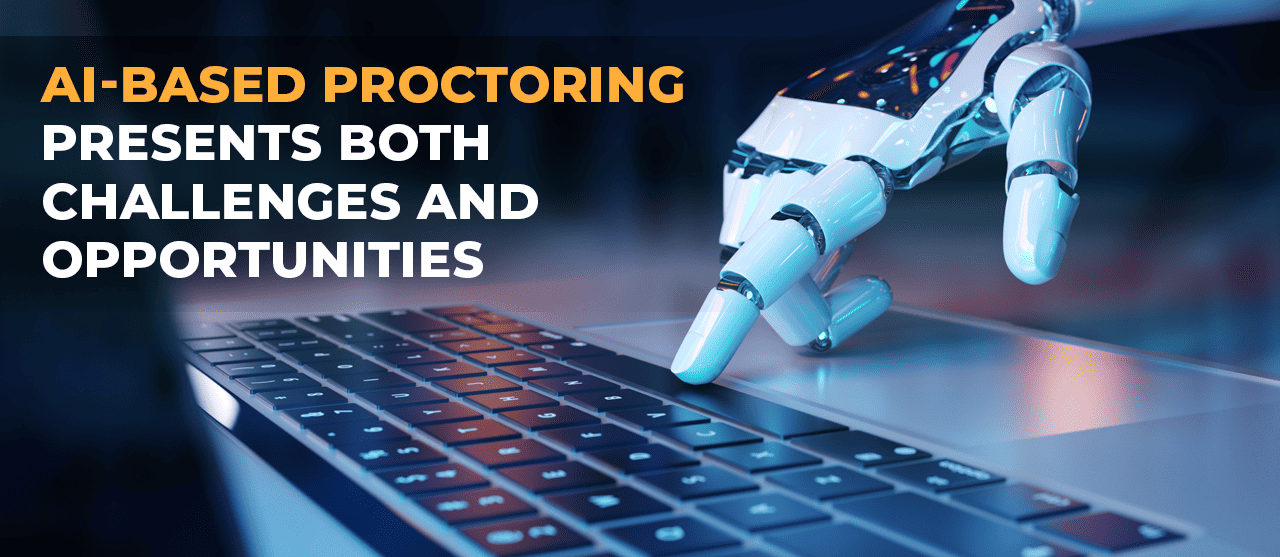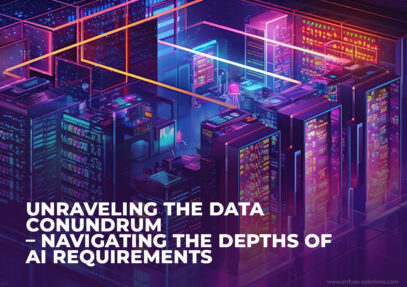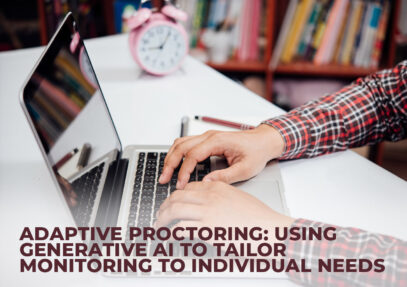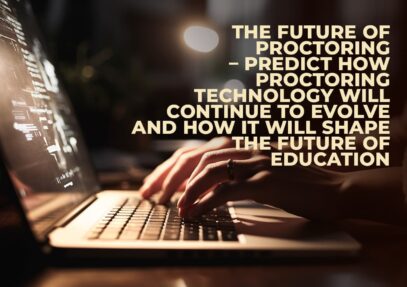
As educational institutions and universities continue to switch to the online learning model, remote proctoring using digital tools and technologies is on the rise. Arjun Mohan of upGrad talks about “tech-driven education as the only way forward” while Shweta Doshi of GreyAtom comments that “it’s an exciting time for educators to challenge the status quo on how to assess our learners.”
An April 2020 study conducted by Educause found that 54% of educational institutions are using online or remote proctoring as a means to proctor their online students. With a limited number of human proctors, the education sector is embracing technologies like Artificial Intelligence (AI) to automate their proctoring.
The popularity of AI-based proctoring is also encouraging corporate employers to adopt proctoring tools to screen potential employees in their learning and development (L&D) initiatives. In some cases, the effectiveness of AI-based proctoring drives its use as the sole method for remote proctoring. The question then arises is “Is AI good enough as the sole method of remote proctoring?” To help answer that question, we’ll first take a look at some challenges posed by AI-based proctoring.
5 Primary Challenges Posed by AI-based Proctoring
1. Multiple Prerequisites
There is no doubt about the many benefits of AI-based remote proctoring. However, the flip side is that this method of online proctoring has many prerequisites such as the need for a functional laptop, high-resolution webcams, high-speed Internet, and other software like voice detection and browser locks.
Learners in remote areas with limited infrastructure or poor connectivity likely cannot effectively adopt these proctoring methods. This is true for developing nations where such technology facilities are available only for a selected few – while the wider population has limited access to real-time technology.
2. False Flagging
While real-time AI-based proctoring tools can detect most instances of dishonest activity, there are increased chances of false flagging of suspicious behavior. For example, there have been documented instances of AI tools triggering “false flags” for mundane activities like when an exam candidate simply looks away from their device screen.
Without the benefit of a live human proctor to validate such behavior, the AI tool has complete power to falsely flag the student for “inappropriate” behavior – leading to unnecessary disciplinary action against the student. As a result, many students have reported “feeling stressed” due to constant monitoring by technology – and the inability to talk to a human proctor during such moments.
3. Bias in Facial Recognition
In his MIT Technology Review article, academic librarian & researcher, Shea Swauger discusses facial recognition tools that are “racist, sexist, and transphobic over and over again.” While these claims may sound extreme, AI-based test proctoring tools have also been alleged to show biases against Black or marginalized students.
For instance, Shea talks about the case of a Black female university student being denied access to a test when a proctoring tool could not validate her identity. Some proctoring solutions have been known to “occasionally fail to pick up students’ faces if they are in poorly lit spaces.”
Even without false flagging, younger students have reported higher stress levels simply due to having technology that continuously monitors their activities.
4. Continuous Monitoring of Students
Can AI-based proctoring stop students from cheating? In her opinion piece in the Cougar, Anna Baker opines that AI-driven tools that utilize facial recognition and eye-tracking, “may also recognize noises in the room and count that as cheating behavior.”
This can be a pain point for students at home who “may not have a quiet private space to take the test.” Students have also reported bad test anxiety simply because their behavior is being recorded and analyzed by AI tools.
5. Data Privacy Concerns
Do AI-based proctoring tools force students to share their data? Recent trends seem to suggest so. For example, companies offering remote proctoring services are known to collect sensitive information like their device’s IP address and biometrics including fingerprints and retina scans.
While some of this collected data may be essential for the delivered services, there is little clarity on how long this data will be retained with the company – thus raising concerns about data privacy.
In a recent case, MIT students raised their voices against the need to download a spyware tool on their devices for proctoring exams. The key issue being once downloaded, this tool will be provided complete access to stored files, webcam, and microphone, as well as the ability to view the device screen.
Opportunities for AI Technology to Enhance Manual (or Human) Proctoring
Despite its challenges and constraints, AI-based proctoring has its share of “pros” such as reducing human oversight during exam sessions. AI proctoring tools are also designed to monitor multiple students at the same time for any suspicious behavior. Over time, “smarter” AI proctoring models can be continually improved with more data points that can help reduce false flagging.
Using available technology, a human proctor (i.e., manual proctoring) can be effectively used to monitor exam candidates online and in real time. During such sessions, if the candidate is facing a real issue, the human proctor can easily intervene and solve their problem in the moment, which improves the test-takers experience and can reduce their exam-related stress.
By blending AI-based and human proctoring, remote proctoring services can evolve to provide an “error-free” student assessment experience – while retaining the valuable “human touch.” While AI technologies can be used for effective student monitoring, human proctors can leverage the technology to enter the student’s online exam session to investigate any fraudulent behavior that is detected.
This hybrid or mixed approach is generally more effective than using either AI-based or human proctoring alone.
Conclusion
Despite its many challenges, AI-based proctoring can be effectively used as a tool for conducting “free & fair” online exams. As explained by Shweta Doshi, remote proctoring platforms provide an opportunity to personalize learning and “give constant feedback for learning, along with a path and recommendation to improve.”
With over 36 years of cumulative experience in digital transformation and solution scaling, EnFuse Solutions has been a true partner for our clients. We support their objectives and priorities with our wide range of digital solutions and our proven success with scaling execution teams including online proctoring. Contact us to learn more about how we can help you and your organization succeed.
Leave a Reply
Your email address will not be published. Required fields are marked *


















Comment